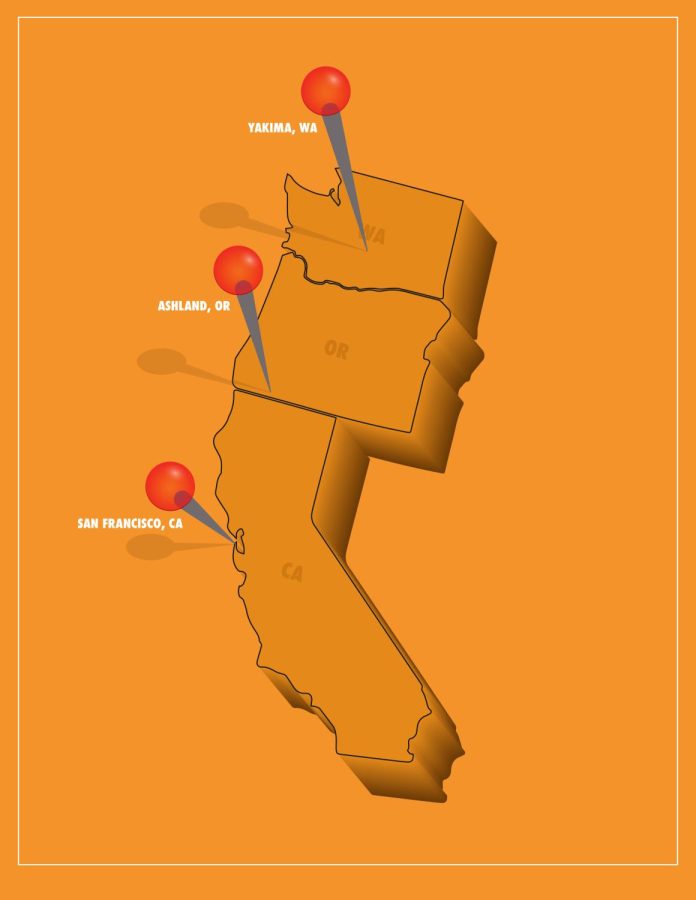Lending a helping hand: OSU alternative spring breaks offer service opportunities
March 6, 2023
Oregon State University offers an alternative to spring break that gives students the opportunity to travel to one of three Pacific Northwest communities to experience a week-long immersive program where they engage and learn directly from the community.
According to OSU’s student experiences and engagement site, groups of 10-12 students participating in the program will have the choice between communities in Washington, California and Southern Oregon to immerse themselves in and learn from their communities.
Dating back to 2010, the program allows students to engage with the communities through direct service projects, educational conversations and presentations and reflective dialogue with community leaders. This offers an opportunity to explore the complexity of social issues, then reflect on and develop their ability to lead for social change.
Olivia Hulbert, program leader and specialist for OSU’s Community Engagement and Leadership said her most transformative leadership experience was co-leading an alternative spring break to Yakima, Washington for a week last spring.
“My co-leader and I led ten OSU students to Yakima where we spent the week engaging with the various communities that exist there and learning about how these communities co-exist and share land and history,” Hulbert said.
Hulbert said this year students will be given a chance to learn from three separate communities. In San Francisco, California, students will stay for a week and participate in community projects surrounding homelessness.
They will explore the complex factors impacting food and housing security in San Francisco and will be completing hands-on projects such as preparing and serving meals and assembling wellness kits.
Another opportunity will be for students to travel to Ashland, Oregon to learn about the pressing environmental conservation and restoration issues in the area. For a week, students will enjoy a hands-on experience working on service projects that may include creek restoration, planting native species, mulching, invasive species removal and other environmental restoration and conservation projects.
Students will be learning from local environmental leaders about impacting threats and factors on natural habitats and ecosystems. There will also be a focus on sustainability, renewable energy and waste reduction.
A third alternative spring break opportunity for students will be the immersion into the communities of Yakima Valley, Washington. There they will stay for a week learning about the impact of land acquisition, settler colonization and immigration.
The focus will be on the experiences of the Yakama Nation, Filipino-Americans, the Latinx community and undocumented migrant workers and their families.
Students will also work with individuals and families experiencing housing insecurity, economic disparities, food insecurity, influences of agriculture and environmental justice.
Hulbert, who led the Yakima trip last year, said some activities were particularly powerful.
“We sat on a hillside examining the Treaty that was written when much of the land was forcibly removed from different Indigenous communities. We also shared meals with community partners who told us parts of their stories, and we went and did projects with them to better understand what led to their work on social causes,” Hulbert said.
Hulbert also said that one of the ways they were able to help and give back to the community was by building a wheelchair ramp onto the home of a member of the Yakama Nation so she could be approved to come home from the hospital.
To participate in the Alternative Break program, there is a $200 program fee that includes transportation from the OSU campus to the program location and back, lodging in shared and communal housing, seven dinners — six prepared by the team and one dinner out together — as well as two dinners provided at send off, food staples for preparing breakfast, lunch and travel meals.
However, OSU believes no student should be excluded from participation due to financial barriers, and is offering program fee waivers.
Students can go to https://cel.oregonstate.edu/students/altbreaks for additional details. The deadline to apply is March 3 and students can find Olivia Hulbert under the contact information if they have any questions about the program.
According to Hulbert, the Alternative Break Program is one where students can gain personal growth while expanding their understanding of both history and the realities of today.
“It is an experience that is beautiful and challenging and really worth it,” Hulbert said.










































































































